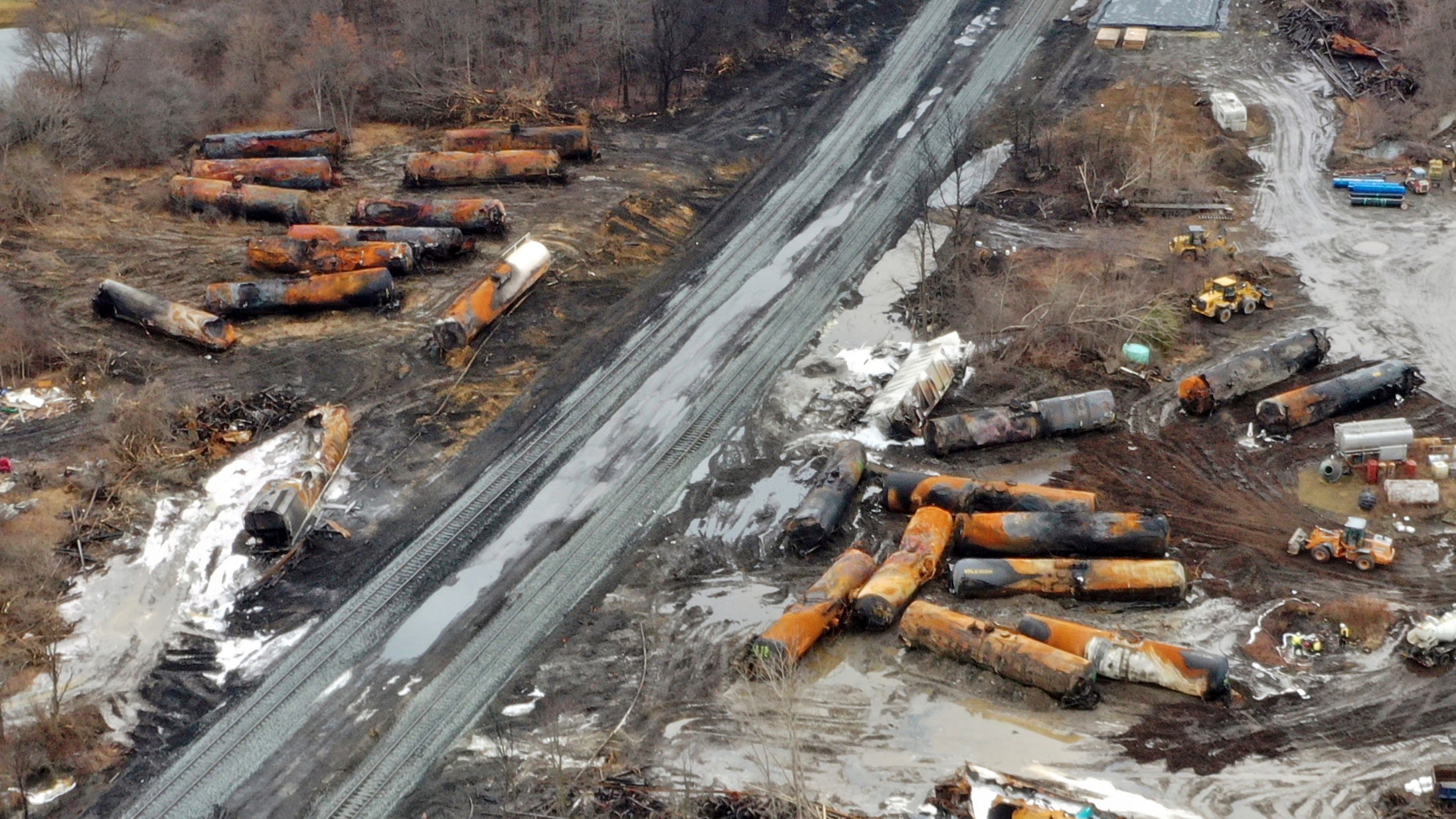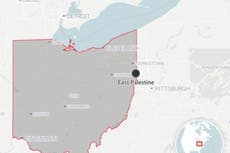The DC blame game begins over Ohio train derailment. Whose fault is it?
Experts argue industry practices, mechanical issues, regulations, and labour problems all contributed to crash, writes Josh Marcus


“The only way I can describe it is like the doors of hell were open.”
That’s how Mahoning County Hazmat chief Steve Szekely described the acrid cloud of black smoke that went up in the aftermath of the 3 February train derailment in East Palestine, Ohio, where large sections of a train with 150 cars, some of them carrying toxic chemicals, went sliding off the tracks.
That disaster has caused residents and local wildlife to suffer a variety of symptoms, and has caused chaos of its own in Washington, as officials have sought to pin the tragedy on one party or policy.
It’s said that success has many fathers but failure is an orphan. It’s clear, according to experts, that both parties, multiple administrations, as well as railway companies and labour leaders, share the blame for the striking rail accident.
The immediate cause of the derailment, according to the National Transportation Safety Board’s preliminary investigation, was a wheel bearing on one of the train’s cars becoming overheating and failing just before the crash.
The deeper reasons for the crash are more complex.
Crippled regulations
Some, like Steven Ditmeyer, a former top official at the Federal Railroad Administration, argue the federal government hasn’t done enough to champion Electronically Controlled Pneumatic brakes, a braking system that would update existing rail brake technologies, which date back to the Civil War era in some places.
"Would ECP brakes have reduced the severity of this accident? Yes," Mr Ditmeyer told Lever News.
In 2015, the Obama administration passed a rule requiring ECP brakes on some trains carrying hazardous materials, but ignored the NTSB’s request that the rules apply to all such trains. The Trump administration, lobbied by rail carriers including Norfolk Southern, the company which operated the train that derailed in Ohio, rescinded the rules entirely.
Sherrod Brown, US Senator for Ohio, argues the GOP carries the share of the blame for the rollback.
“We are concerned that the Trump administration rolled back some of the safety rules and some of the railroad safety and worker safety rules,” he told The Independent, adding, “I mean, every chance Republicans get they weaken worker safety rules, they weaken and weaken environmental rules. They weaken consumer protection rules. So we want to know if we’ve got to fix that. But that doesn’t help East Palestine now.”
The rail industry, meanwhile, argues such braking technologies are still unproven. Association of American Railroads spokeswoman Jessica Kahanek told USA Today ECP brakes have a “significant” failure rate.
A declining labour force
Others blame labour conditions at the nation’s rail carriers for causing declining staffing and lower safety standards.
“It speaks to the conditions on the railroad,” Vermont Senator Bernie Sanders told The Independent. “I think some of the workers, they will tell you that they thought something like this was inevitable and that we have to deal with a situation where in the last six years 30 per cent of that workforce was cut back."
Facing competition from ground freight, rail carriers, including Norfolk Southern, have embraced a practice known as precision scheduled railroading (PSR), an approach which centres on maximizing the utility of each individual rail car rather than considering whole trains as a single unit.
In practice, PSR has meant longer trains, overseen by fewer workers, sometimes with loads dangerously weighted towards the back of rail convoys, according to railway unions.
“The short-term profit imperative, the so-called ‘cult of the Operating Ratio’—of NS [Norfolk Southern] and the other Class 1 railroads—has made cutting costs, employees, procedures, and resources the top priority,” Railroad Workers United told The New Republic.
“The wreck of Train 32N has been years in the making. What other such train wrecks await us remains to be seen…but given the modus operandi of the Class One rail carriers, we can no doubt expect future disasters of this nature.”
As The Independent has reported, railway workers have argued the self-proclaimed pro-labour Biden administration betrayed them during ongoing contract negotiations, after it backed a December deal to head off potential strike action while avoiding worker demands like an end to PSR and sick leave.

“Politicians are happy to voice platitudes and heap praise upon us for our heroism throughout the pandemic, the essential nature of our work, the difficult and dangerous and demanding conditions of our jobs. Yet when the steel hits the rail, they back the powerful and wealthy Class One rail carriers every time,” RWU General Secretary Jason Doering said during the negotiations.
“In our view, I don’t think you can separate the drastic reduction in workforce over the past seven or eight years, from the increase in accidents, the rate of safety incidents,” Greg Regan, president of the Transportation Trades Department of the AFL-CIO, told USA Today of the recent derailment, arguing job losses and scheduling changes have cut down the number of staff on trains and the time allotted to perform inspecitons. “What people see on the ground is a really big amount of pressure on moving as fast as possible, as lean as possible, and generating as much profit as possible.”
Norfolk Southern alone has lost 40 per cent of its workforce in recent years, per SEC filings.
Is the federal government doing enough?
Lawmakers from both parties have argued the Department of Transportation, helmed by Pete Buttigieg, doesn’t seem to be doing enough to prevent further tragedies.
“We need Congressional inquiry and direct action from Pete Buttigieg to address this tragedy,” Minnesota congresswoman Ilhan Omar, a Democrat, wrote on Twitter on Monday.
“Fully agree,” Texas Republican Senator Ted Cruzwrote in response.
In response to both legislators, Secretary Buttigieg said, “We could start by discussing immediate steps Congress could take to address rail safety and reduce constraints on USDOT in this area. Give us a call, we can do some good work.”
Mr Buttigieg has defended the Biden administration’s work on the rail system, pointing to “historic investments in rail safety” coming through the Bipartisan Infrastructure Law, as well as a round of grants in June providing $120m for rail safety.
“Good regulation and effective enforcement are key to lowering the risk of rail incidents, injuries and fatalities,” Mr Buttigieg said in statement on Twitter after the disaster. “DOT is continually updating and enforcing our rail regulations to make trains safer and push the injury rate toward zero.
The DOT is currently considering a proposed regulation, backed by the rail industry, which would reduce the frequency of brake testing on some trains.
Both parties can agree that something needs to change.
“How did this happen?” Ohio Senator JD Vance, a Republican, told The Independent. “How do you prevent it from happening in the future?”
“We have to put our eyes on this problem, learn from it, and make sure that regulatory and administrative structure is able to protect against it,” added Senator Ed Markey of Massachusetts, a Democrat.
Join our commenting forum
Join thought-provoking conversations, follow other Independent readers and see their replies
Comments



Bookmark popover
Removed from bookmarks